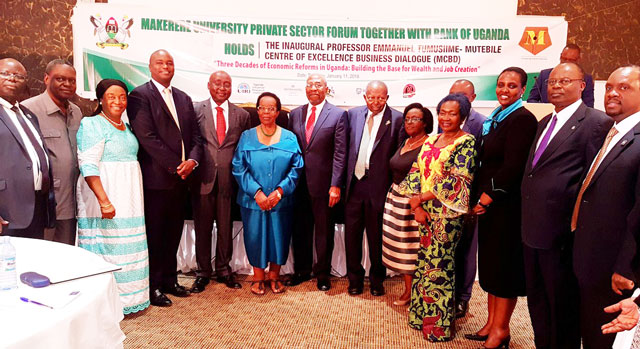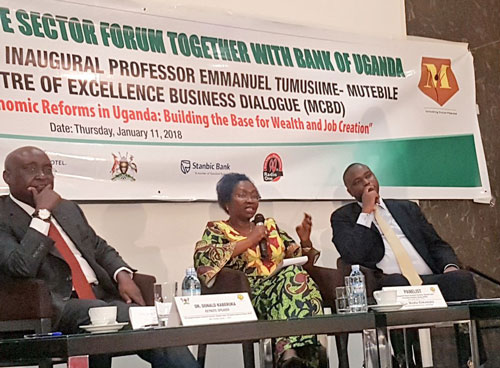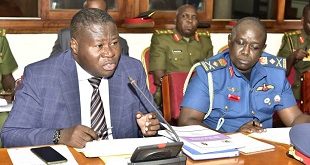
Kampala, Uganda | THE INDEPENDENT | Makerere University has offered land and space where the proposed Tumusiime-Mutebile Centre of Excellence for Private Sector Development will be constructed and hosted.
Council Chairperson of Makerere University Prof. Charles Wana Etyem confirmed the development at Thursday’s inaugural Tumusiime-Mutebile Center of Excellence (TMCE) business dialogue in Kampala at Naguru Skyz Hotel.
“It is my hope that the TMCE will encourage our professors, business people like Patrick Bitature to come and pass on their ideals to colleagues and students of the university,” said Prof. Wana Etyem.
Keynote speaker at the dialogue Dr. Donald Kaberuka was confident about the future of the centre and Africa.
“The Tumusiime-Mutebile Centre for Excellence will not be a bridge to nowhere, ” said Kaberuka , adding that centre has to be different and ask a different set of questions.
“I think we need the Tumusiime-Mutebile Centre of Excellence in Africa to build a new multinational-inter-generational project. Something that will bring us as a continent together.”
Professor Emmanuel Tumusiime-Mutebile is a long serving governer of Bank of Uganda while Kaberuka is a former Rwandan Minister of Finance, President Emeritus of the African Development Bank and current joint chair of the London School of Economics – Oxford Commision on State Fragility, Growth and Development.
Panelists at the discussion included former Uganda finance minister Maria Kiwanuka, Stanbic MD Patrick Mweheire and Prof Charles Kwesiga, ED at UIRI.
Prime Minister Dr Ruhakana Rugunda was chief guest at the dialogue organised by the Makerere University Private Sector Forum and the Bank of Uganda.

Role of TMCE
In his keynote address, Kaberuka said the TMCE should create strong synergies and a meeting point for dialogue between academia, the private sector and the government agencies.
“What will the TMCE do to elevate the nature of discussion around growth? The problems raised in this discussion are not only Ugandan problems. What differentiates them is how and who solves theses problems,” he said.
On education
Kaberuka raised the issue of education that was inherited from the colonial governments and proposed the TMCE would be the best place to discuss this challenge.
“We need to think about providing education that is affordable and linked to increasing industrial output of the continent. It is important to invest not only in education, but also in increasing the education output that can build an industrialized base,” Kaberuka said, in response to a remark by one of the panelists Mwehire.
Mweheire had said there has to be a connection between what needs are in the market place and what the country is churning out in the education sector.
Natural Resources
“As center like this could be helpful in exploring the link between economic growth and natural resources,” Kaberuka said, adding “Let us not leave this room thinking that Africa is not moving. It is moving, we are going places. The only thing we have to do is figure out how to get to formative transformation.
Smart countries
“The challenge of many of our countries is – growth with transformation . There’s a lot of discussion about economic growth. Growth needs to provide equal opportunities for all and must manage external and internal shocks with resilience.”
“Winning economies require a private sector and a government sector that are joined at the hip. These synergies as the PM said, are important.”
“The dialogue could begin on addressing the mismatch between ambitions and capacity,” Kaberuka said.
African challenges
Kaberuka said today African countries face challenges that no longer respond to past policies. “These challenges require fresh thinking,” he said.
“Every African country has a plan to be a middle income economy by 2030. However, what stands between us achieving this goal?”
“Some of these challenges include complex demographics, the effects of climate change, the state of geo-politics among others. The continent has to explore new strategies on dealing with these issues.”
Mutebile had earlier remarked that the occasion presents an opportunity and a challenge to ask frank questions as the country attempts to focus on alternative direction for Africa socio-economic transformation.
“It is a new hub for providing transformative and alternative solutions for private sector growth and employment creation in Uganda,” Mutebile said.
Private Sector Forum Chairman Bitature capped the discussion by calling for action. “We keep on talking. We have these nice plans but we need to implement them,” he said.
*Source BOU MEDIA
 The Independent Uganda: You get the Truth we Pay the Price
The Independent Uganda: You get the Truth we Pay the Price


